Abstract
The nonrecirculating isolated perfused rat liver was used to study biliary antibiotic excretion by the liver in a steady-state, controlled environment in which bile flow, bile salt output, and antibiotic delivery were maintained under constant conditions. The effects of piperacillin, ampicillin, and gentamicin on bile flow and bile salt output were analyzed; none altered bile salt output, and only high concentrations of piperacillin (100 micrograms/mL) increased bile flow. The ratio of antibiotic concentration in bile and perfusate depended on the type of antibiotic and perfusate concentration. Piperacillin infusions at perfusate concentrations of 50 or 100 micrograms/mL (in the presence of 60 microM taurocholate) yielded bile to perfusate ratios of 112 +/- 10 versus 49 +/- 3, respectively. Using similar perfusate, the concentration ratios for ampicillin (20 micrograms/mL) and gentamicin (10 micrograms/mL) were only 3.4 +/- 0.5 and 0.5 +/- 0.1, respectively. By altering the perfusate to contain either 60 microM or 240 microM taurocholate, we found variance in bile salt output from 27 +/- 1 to 115 +/- 2 mumol/h, yet this alteration had little effect on the output of ampicillin (perfusate concentration of 20 micrograms/mL), 73 +/- 7 versus 74 +/- 12 micrograms/h, or piperacillin (perfusate concentration 100 micrograms/mL), 10 +/- 1 versus 11 +/- 2 mg/h. Thus, it appears ampicillin and piperacillin are excreted into bile at high concentrations by bile salt-independent pathways. Partial biliary obstruction (6 cm H2O) results in significant decreases in bile volume. Infusion of 50 micrograms/mL of piperacillin resulted in increased biliary flow that approached nonobstructed values. Obstruction resulted in significant decreases in bile piperacillin concentration. Whether the choleretic effect of high concentrations of piperacillin has any clinical significance in nonobstructed or obstructed conditions remains to be established.
Full text
PDF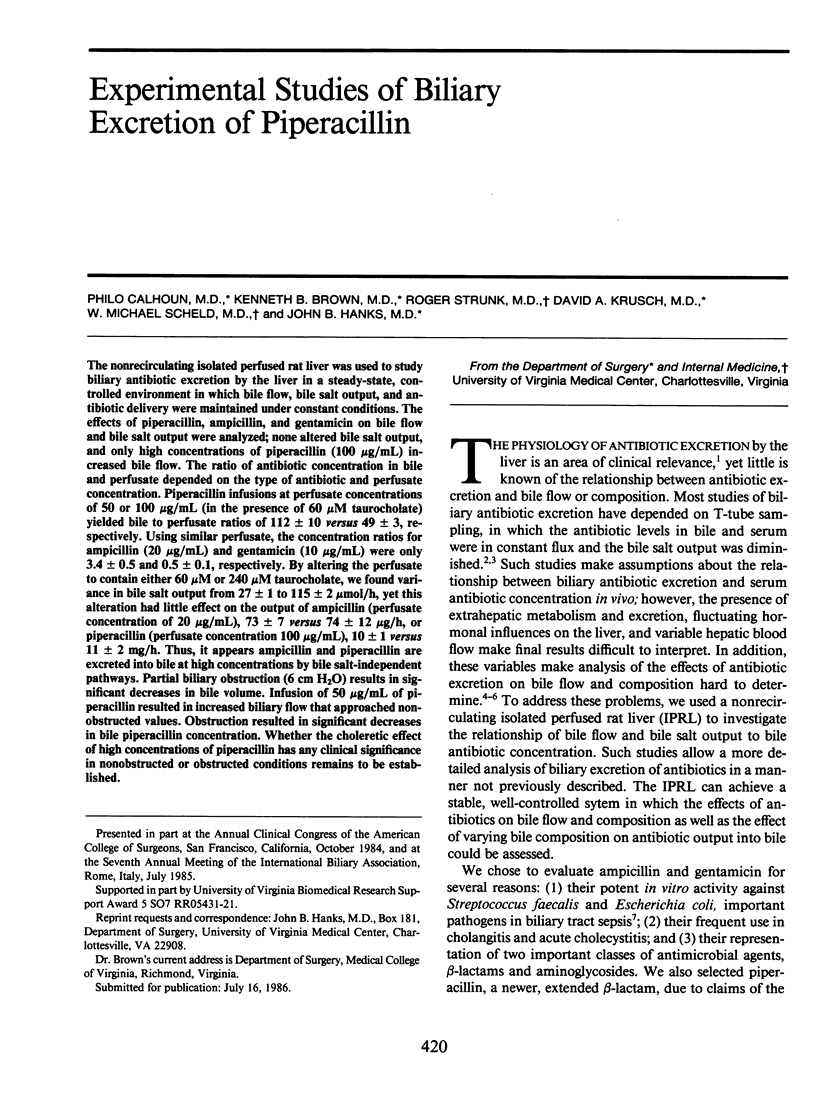
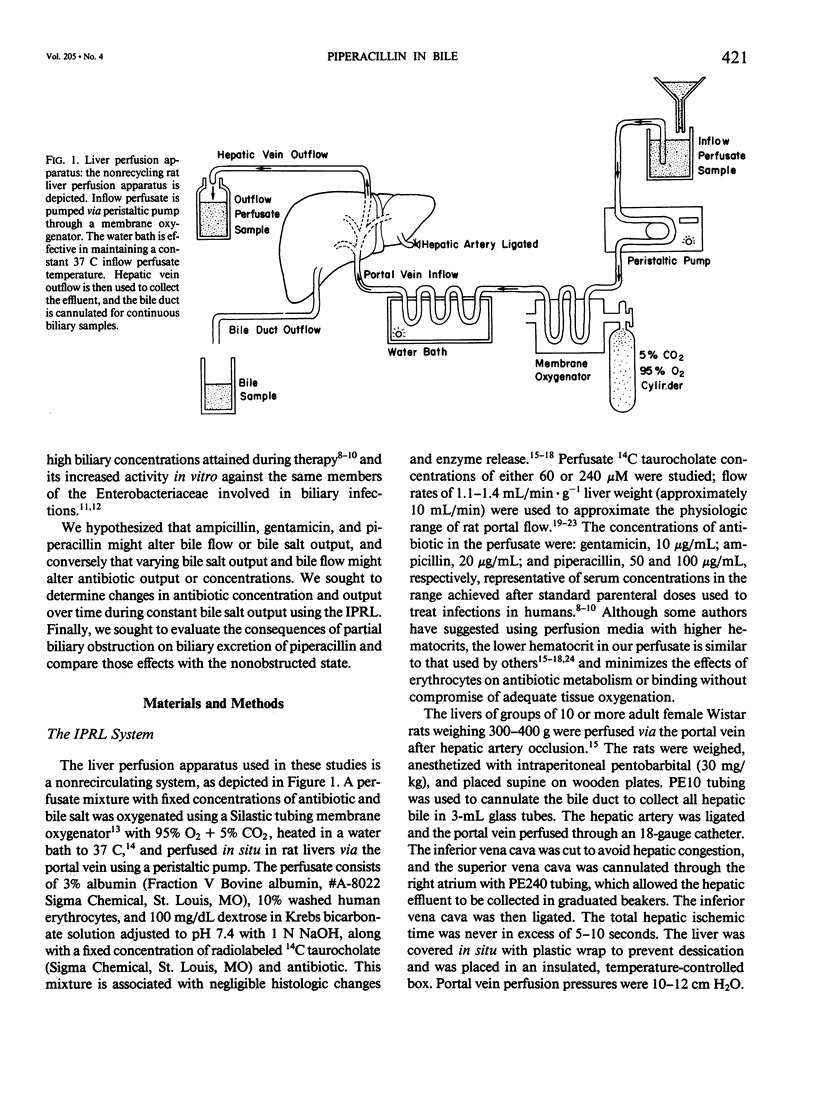
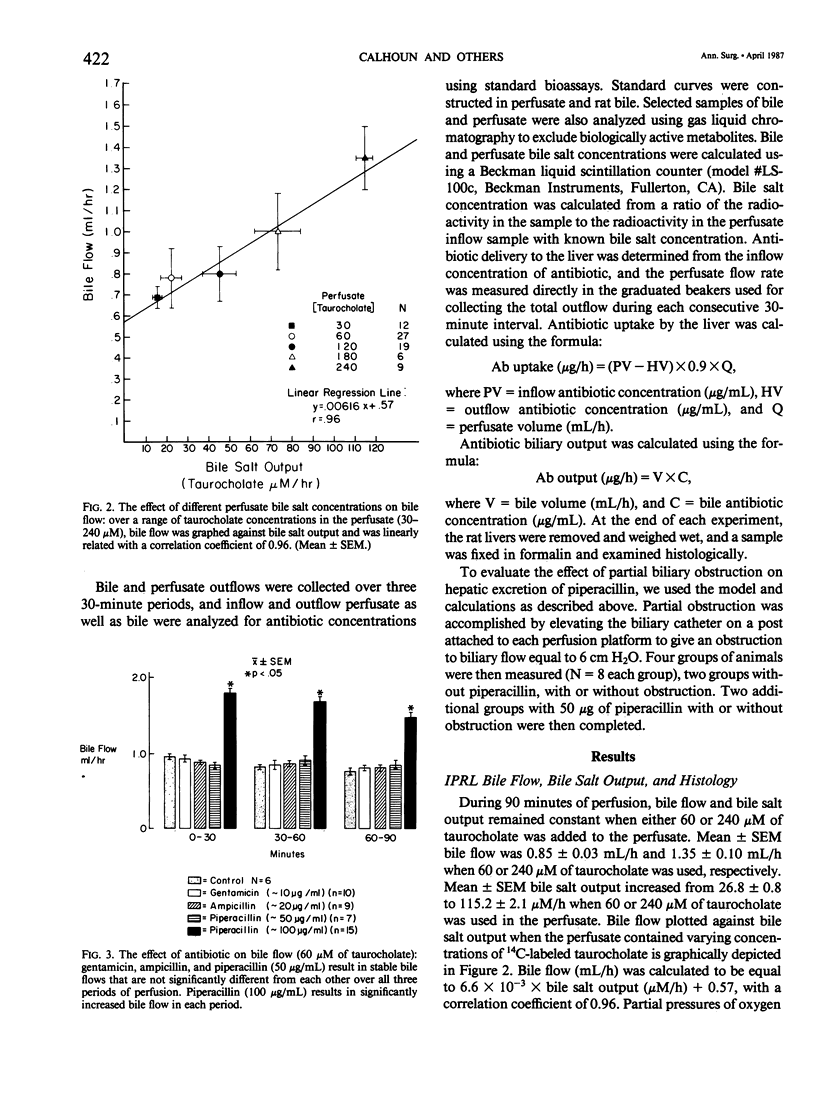
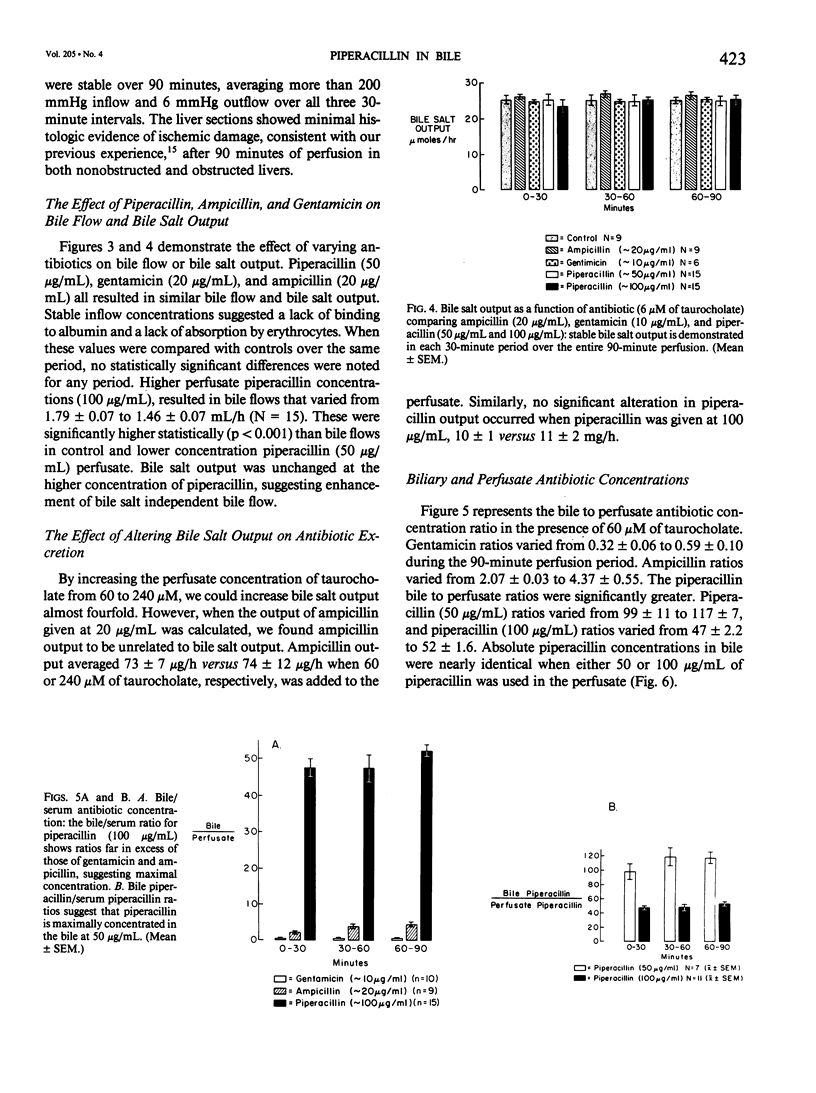
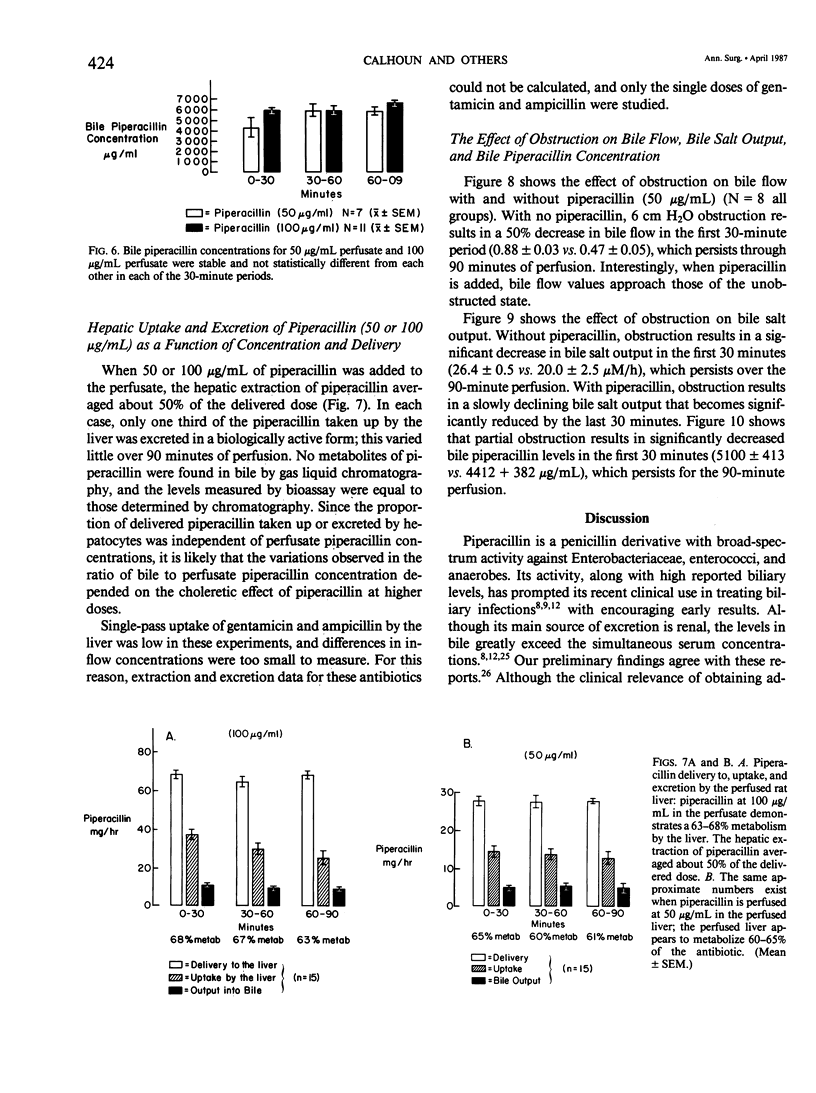
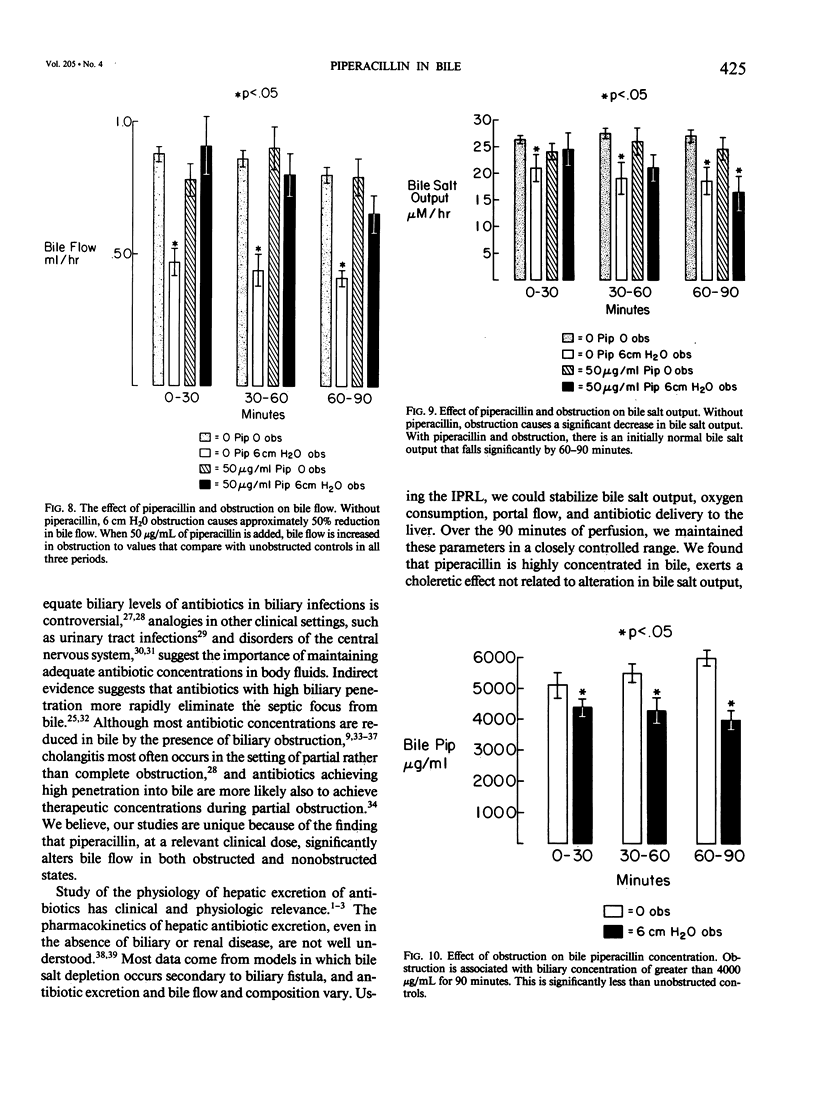
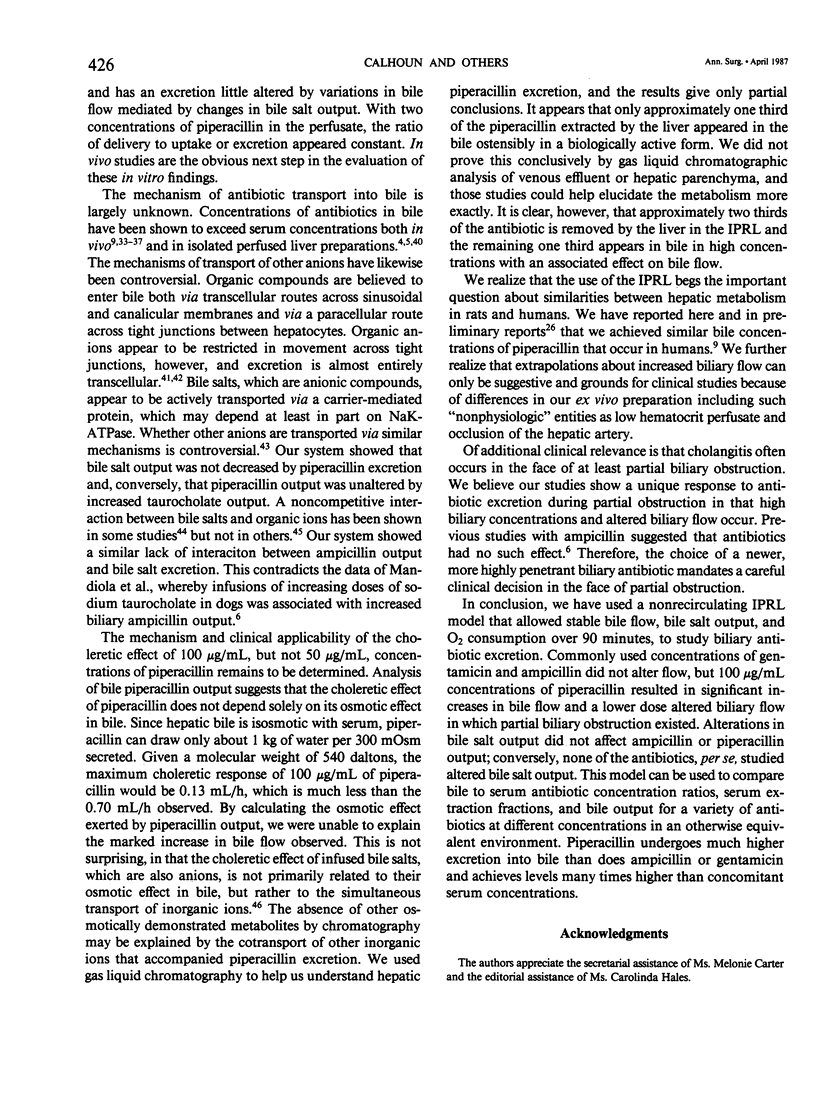
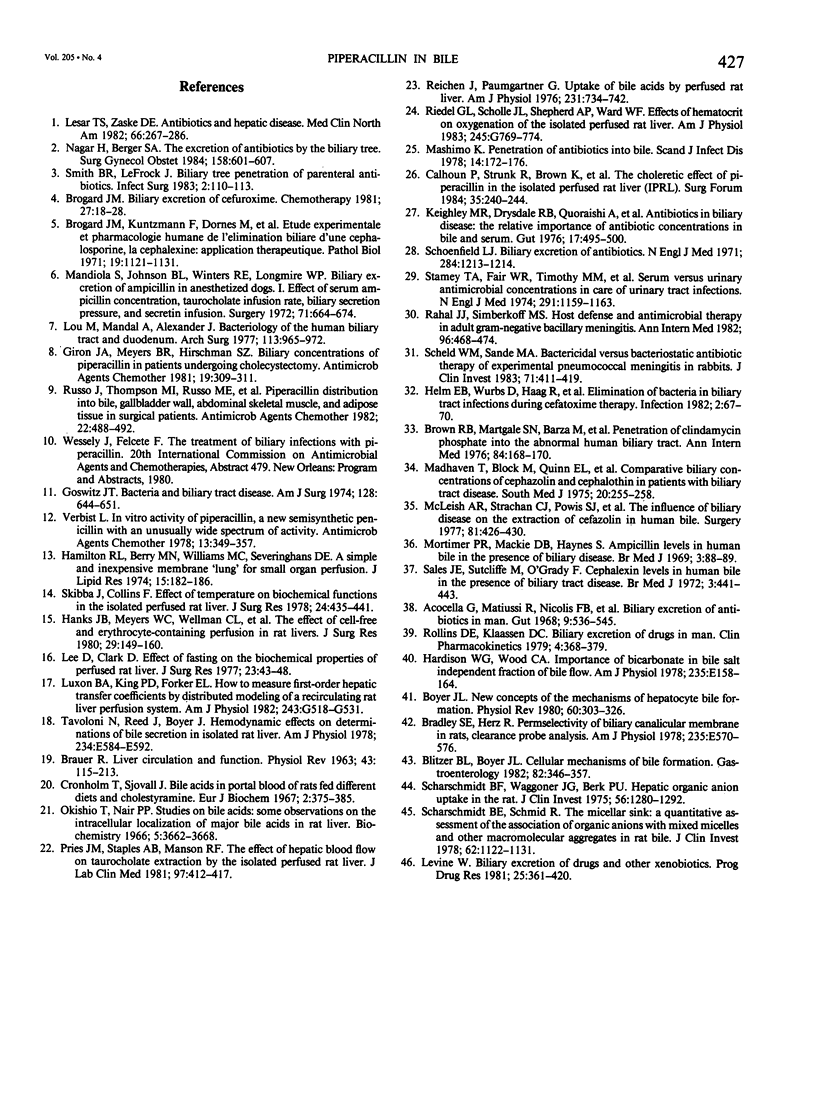
Selected References
These references are in PubMed. This may not be the complete list of references from this article.
- Acocella G., Mattiussi R., Nicolis F. B., Pallanza R., Tenconi L. T. Biliary excretion of antibiotics in man. Gut. 1968 Oct;9(5):536–545. doi: 10.1136/gut.9.5.536. [DOI] [PMC free article] [PubMed] [Google Scholar]
- BRAUER R. W. Liver circulation and function. Physiol Rev. 1963 Jan;43:115–213. doi: 10.1152/physrev.1963.43.1.115. [DOI] [PubMed] [Google Scholar]
- Blitzer B. L., Boyer J. L. Cellular mechanisms of bile formation. Gastroenterology. 1982 Feb;82(2):346–357. [PubMed] [Google Scholar]
- Boyer J. L. New concepts of mechanisms of hepatocyte bile formation. Physiol Rev. 1980 Apr;60(2):303–326. doi: 10.1152/physrev.1980.60.2.303. [DOI] [PubMed] [Google Scholar]
- Bradley S. E., Herz R. Permselectivity of biliary canalicular membrane in rats: clearance probe analysis. Am J Physiol. 1978 Nov;235(5):E570–E576. doi: 10.1152/ajpendo.1978.235.5.E570. [DOI] [PubMed] [Google Scholar]
- Brogard J. M., Kuntzmann F., Dorner M., Haegele P., Lavillaureix J. Etude expérimentale et pharmacologie humaine de l'élimination biliaire d'une céphalosporine, la céphalexine. Application thérapeutique. Pathol Biol (Paris) 1971 Dec;19(23):1121–1131. [PubMed] [Google Scholar]
- Brogard J. M., Pinget M., Arnaud J. P., Dorner M., Lavillaureix J. Biliary excretion of cefuroxime. Experimental and human study. Chemotherapy. 1981;27(1):18–28. doi: 10.1159/000237950. [DOI] [PubMed] [Google Scholar]
- Brown R. B., Martyak S. N., Barza M., Curtis L., Weinstein L. Penetration of clindamycin phosphate into the abnormal human biliary tract. Ann Intern Med. 1976 Feb;84(2):168–170. doi: 10.7326/0003-4819-84-2-168. [DOI] [PubMed] [Google Scholar]
- Cronholm T., Sjövall J. Bile acids in portal blood of fats fed different diets and cholestyramine. Bile acids and steroids 189. Eur J Biochem. 1967 Nov;2(4):375–383. doi: 10.1111/j.1432-1033.1967.tb00148.x. [DOI] [PubMed] [Google Scholar]
- Giron J. A., Meyers B. R., Hirschman S. Z. Biliary concentrations of piperacillin in patients undergoing cholecystectomy. Antimicrob Agents Chemother. 1981 Feb;19(2):309–311. doi: 10.1128/aac.19.2.309. [DOI] [PMC free article] [PubMed] [Google Scholar]
- Goswitz J. T. Bacteria and biliary tract disease. Am J Surg. 1974 Nov;128(5):644–646. doi: 10.1016/s0002-9610(74)80019-x. [DOI] [PubMed] [Google Scholar]
- Hamilton R. L., Berry M. N., Williams M. C., Severinghaus E. M. A simple and inexpensive membrane "lung" for small organ perfusion. J Lipid Res. 1974 Mar;15(2):182–186. [PubMed] [Google Scholar]
- Hanks J. B., Meyers W. C., Wellman C. L., Hill R. C., Jones R. S. The effect of cell-free and erythrocyte-containing perfusion in rat livers. J Surg Res. 1980 Aug;29(2):149–160. doi: 10.1016/0022-4804(80)90033-5. [DOI] [PubMed] [Google Scholar]
- Hardison W. G., Wood C. A. Importance of bicarbonate in bile salt independent fraction of bile flow. Am J Physiol. 1978 Aug;235(2):E158–E164. doi: 10.1152/ajpendo.1978.235.2.E158. [DOI] [PubMed] [Google Scholar]
- Helm E. B., Wurbs D., Haag R., Bentele D., Shah P. M. Elimination of bacteria in biliary tract infections during ceftizoxime therapy. Infection. 1982;10(2):67–70. doi: 10.1007/BF01816726. [DOI] [PubMed] [Google Scholar]
- Keighley M. R., Drysdale R. B., Quoraishi A. H., Burdon D. W., Alexander-Willians J. Antibiotics in biliary disease: the relative importance of antibiotic concentrations in the bile and serum. Gut. 1976 Jul;17(7):495–500. doi: 10.1136/gut.17.7.495. [DOI] [PMC free article] [PubMed] [Google Scholar]
- Lee D., Clark D. G. Effect of fasting on the biochemical properties of perfused rat liver. J Surg Res. 1977 Jul;23(1):43–49. doi: 10.1016/0022-4804(77)90189-5. [DOI] [PubMed] [Google Scholar]
- Levine W. G. Biliary excretion of drugs and other xenobiotics. Prog Drug Res. 1981;25:361–420. [PubMed] [Google Scholar]
- Lou M. A., Mandal A. K., Alexander J. L., Thadepalli H. Bacteriology of the human biliary tract and the duodenum. Arch Surg. 1977 Aug;112(8):965–967. doi: 10.1001/archsurg.1977.01370080063010. [DOI] [PubMed] [Google Scholar]
- Luxon B. A., King P. D., Forker E. L. How to measure first-order hepatic transfer coefficients by distributed modeling of a recirculating rat liver perfusion system. Am J Physiol. 1982 Dec;243(6):G518–G531. doi: 10.1152/ajpgi.1982.243.6.G518. [DOI] [PubMed] [Google Scholar]
- Madhavan T., Block M., Quinn E. L., Cox F., Fisher E. J., Burch K. H., Haas E. J. Comparative biliary concentrations of cephazolin and cephalothin in patients with biliary tract disease. Scott Med J. 1976 Sep;20(5):255–258. doi: 10.1177/003693307502000516. [DOI] [PubMed] [Google Scholar]
- Mandiola S., Johnson B. L., Jr, Winters R. E., Longmire W. P., Jr Biliary excretion of ampicillin in the anesthetized dog. I. Effect of serum ampicillin concentration, taurocholate infusion rate, biliary secretion pressure, and secretin infusion. Surgery. 1972 May;71(5):664–674. [PubMed] [Google Scholar]
- Mashimo K. Penetration of antibiotics into bile. Scand J Infect Dis Suppl. 1978;(14):172–176. [PubMed] [Google Scholar]
- McLeish A. R., Strachan C. J., Powis S. J., Wise R., Bevan P. G. The influence of biliary disease on the excretion of cefazolin in human bile. Surgery. 1977 Apr;81(4):426–430. [PubMed] [Google Scholar]
- Mortimer P. R., Mackie D. B., Haynes S. Ampicillin levels in human bile in the presence of biliary tract disease. Br Med J. 1969 Jul 12;3(5662):88–89. doi: 10.1136/bmj.3.5662.88. [DOI] [PMC free article] [PubMed] [Google Scholar]
- Nagar H., Berger S. A. The excretion of antibiotics by the biliary tract. Surg Gynecol Obstet. 1984 Jun;158(6):601–607. [PubMed] [Google Scholar]
- Okishio T., Nair P. P. Studies on bile acids. Some observations on the intracellular localization of major bile acids in rat liver. Biochemistry. 1966 Nov;5(11):3662–3668. doi: 10.1021/bi00875a040. [DOI] [PubMed] [Google Scholar]
- Pries J. M., Staples A. B., Hanson R. F. The effect of hepatic blood flow on taurocholate extraction by the isolated perfused rat liver. J Lab Clin Med. 1981 Mar;97(3):412–417. [PubMed] [Google Scholar]
- Rahal J. J., Simberkoff M. S. Host defense and antimicrobial therapy in adult gram-negative bacillary meningitis. Ann Intern Med. 1982 Apr;96(4):468–474. doi: 10.7326/0003-4819-96-4-468. [DOI] [PubMed] [Google Scholar]
- Reichen J., Paumgartner G. Uptake of bile acids by perfused rat liver. Am J Physiol. 1976 Sep;231(3):734–742. doi: 10.1152/ajplegacy.1976.231.3.734. [DOI] [PubMed] [Google Scholar]
- Riedel G. L., Scholle J. L., Shepherd A. P., Ward W. F. Effects of hematocrit on oxygenation of the isolated perfused rat liver. Am J Physiol. 1983 Dec;245(6):G769–G774. doi: 10.1152/ajpgi.1983.245.6.G769. [DOI] [PubMed] [Google Scholar]
- Rollins D. E., Klaassen C. D. Biliary excretion of drugs in man. Clin Pharmacokinet. 1979 Sep-Oct;4(5):368–379. doi: 10.2165/00003088-197904050-00003. [DOI] [PubMed] [Google Scholar]
- Russo J., Jr, Thompson M. I., Russo M. E., Saxon B. A., Matsen J. M., Moody F. G., Rikkers L. F. Piperacillin distribution into bile, gallbladder wall, abdominal skeletal muscle, and adipose tissue in surgical patients. Antimicrob Agents Chemother. 1982 Sep;22(3):488–492. doi: 10.1128/aac.22.3.488. [DOI] [PMC free article] [PubMed] [Google Scholar]
- Sales J. E., Sutcliffe M., O'Grady F. Cephalexin levels in human bile in presence of biliary tract disease. Br Med J. 1972 Aug 19;3(5824):441–443. doi: 10.1136/bmj.3.5824.441. [DOI] [PMC free article] [PubMed] [Google Scholar]
- Scharschmidt B. F., Schmid R. The micellar sink: a quantitative assessment of the association of organic anions with mixed micelles and other macromolecular aggregates in rat bile. J Clin Invest. 1978 Dec;62(6):1122–1131. doi: 10.1172/JCI109231. [DOI] [PMC free article] [PubMed] [Google Scholar]
- Scharschmidt B. F., Waggoner J. G., Berk P. D. Hepatic organic anion uptake in the rat. J Clin Invest. 1975 Nov;56(5):1280–1292. doi: 10.1172/JCI108204. [DOI] [PMC free article] [PubMed] [Google Scholar]
- Scheld W. M., Sande M. A. Bactericidal versus bacteriostatic antibiotic therapy of experimental pneumococcal meningitis in rabbits. J Clin Invest. 1983 Mar;71(3):411–419. doi: 10.1172/JCI110785. [DOI] [PMC free article] [PubMed] [Google Scholar]
- Schoenfield L. J. Biliary excretion of antibiotics. N Engl J Med. 1971 May 27;284(21):1213–1214. doi: 10.1056/NEJM197105272842112. [DOI] [PubMed] [Google Scholar]
- Skibba J. L., Collins F. G. Effect of temperature on biochemical functions in the isolated perfused rat liver. J Surg Res. 1978 May;24(5):435–441. doi: 10.1016/0022-4804(78)90040-9. [DOI] [PubMed] [Google Scholar]
- Stamey T. A., Fair W. R., Timothy M. M., Millar M. A., Mihara G., Lowery Y. C. Serum versus urinary antimicrobial concentrations in cure of urinary-tract infections. N Engl J Med. 1974 Nov 28;291(22):1159–1163. doi: 10.1056/NEJM197411282912204. [DOI] [PubMed] [Google Scholar]
- Tavoloni N., Reed J. S., Boyer J. L. Hemodynamic effects on determinants of bile secretion in isolated rat liver. Am J Physiol. 1978 Jun;234(6):E584–E592. doi: 10.1152/ajpendo.1978.234.6.E584. [DOI] [PubMed] [Google Scholar]
- Verbist L. In vitro activity of piperacillin, a new semisynthetic penicillin with an unusually broad spectrum of activity. Antimicrob Agents Chemother. 1978 Mar;13(3):349–357. doi: 10.1128/aac.13.3.349. [DOI] [PMC free article] [PubMed] [Google Scholar]
- Whelton A. Antibiotic pharmacokinetics and clinical application in renal insufficiency. Med Clin North Am. 1982 Jan;66(1):267–281. doi: 10.1016/s0025-7125(16)31459-6. [DOI] [PubMed] [Google Scholar]


